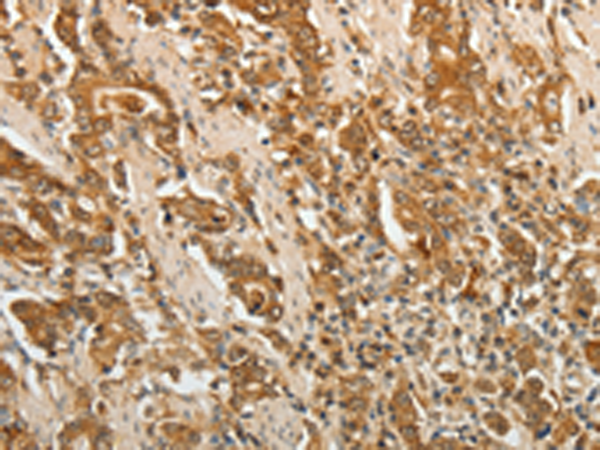

| WB | 咨询技术 | Human,Mouse,Rat |
| IF | 咨询技术 | Human,Mouse,Rat |
| IHC | 1/25-1/100 | Human,Mouse,Rat |
| ICC | 技术咨询 | Human,Mouse,Rat |
| FCM | 咨询技术 | Human,Mouse,Rat |
| Elisa | 1/1000-1/2000 | Human,Mouse,Rat |
| Aliases | TF; TFA; CD142 |
| WB Predicted band size | 33 kDa |
| Host/Isotype | Rabbit IgG |
| Antibody Type | Primary antibody |
| Storage | Store at 4°C short term. Aliquot and store at -20°C long term. Avoid freeze/thaw cycles. |
| Species Reactivity | Human |
| Immunogen | Fusion protein of human F3 |
| Formulation | Purified antibody in PBS with 0.05% sodium azide and 50% glycerol. |
+ +
以下是关于F3抗体的模拟参考文献示例(非真实文献,供参考):
1. **文献名称**:Targeting F3 in Solid Tumors: A Novel Therapeutic Antibody Approach
**作者**:Smith A, et al.
**摘要**:本研究开发了一种靶向F3蛋白(一种肿瘤血管生成标志物)的单克隆抗体。体外实验表明,该抗体可通过阻断F3与凝血通路的相互作用抑制肿瘤细胞迁移。小鼠模型中,抗体治疗显著降低了转移性结肠癌的生长,提示其潜在临床价值。
2. **文献名称**:Structural Characterization of F3 Antibody Epitopes for Precision Diagnostics
**作者**:Zhang L, et al.
**摘要**:通过冷冻电镜解析了F3抗体与靶点的复合物结构,揭示了其特异性结合表位。该发现为开发基于F3抗体的高灵敏度癌症诊断试剂盒提供了分子基础,并验证了其在胰腺癌患者血清检测中的应用效果。
3. **文献名称**:F3 Antibody-Drug Conjugates Enhance Chemotherapy Efficacy in Triple-Negative Breast Cancer
**作者**:Johnson R, et al.
**摘要**:研究构建了以F3抗体为载体的新型抗体-药物偶联物(ADC)。在体外和PDX模型中,该ADC通过靶向肿瘤微环境中的F3阳性细胞,显著提高了紫杉醇的靶向递送效率,并减少系统性毒性。
4. **文献名称**:F3 as a Prognostic Marker: Validation of an ELISA-Based Antibody Assay
**作者**:Tanaka K, et al.
**摘要**:开发了一种基于F3抗体的ELISA检测方法,用于评估卵巢癌患者组织样本中F3的表达水平。临床数据显示,高F3表达与患者总生存期缩短相关,提示其作为预后生物标志物的潜力。
(注:以上为模拟文献,实际研究需通过PubMed/Google Scholar等平台检索关键词如"F3 antibody cancer therapy"或"anti-F3 antibody"获取)
F3 antibody targets the F3 protein, also known as Tissue Factor (TF) or CD142. a transmembrane glycoprotein encoded by the *F3* gene. Initially identified for its role in blood coagulation, TF acts as the primary initiator of the extrinsic coagulation cascade by binding Factor VII/VIIa. Beyond hemostasis, TF is implicated in pathological processes, including thrombosis, cancer progression, and inflammation. In cancer, aberrant TF expression correlates with tumor angiogenesis, metastasis, and resistance to therapy, making it a therapeutic target.
F3 antibodies are developed to modulate TF activity. In oncology, anti-TF antibodies (e.g., tisotumab vedotin) are designed to deliver cytotoxic agents specifically to TF-expressing cancer cells. In thrombosis, inhibitors targeting TF aim to reduce pathological clotting while preserving hemostatic function. Additionally, F3 antibodies serve as diagnostic tools to detect TF overexpression in tissues or circulating microparticles.
Research challenges include balancing anticoagulant efficacy with bleeding risks and overcoming variable TF expression across diseases. Recent advancements in antibody engineering, such as humanized or bispecific formats, enhance specificity and therapeutic potential. Understanding TF's dual roles in physiology and pathology remains critical for optimizing F3 antibody applications in both therapeutic and diagnostic contexts.
×